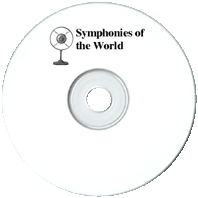

A collection of concerts by the CBS, NBC, and ABC network orchestras provided to AFRS.

8 old time radio show recordings
(total playtime 7 hours, 45 min)
available in the following formats:
1 MP3 CD
or
8 Audio CDs
Text on OTRCAT.com ©2001-2026 OTRCAT INC All Rights Reserved. Reproduction is prohibited.
Symphony is a beautiful word which comes from the Greek meaning "sound together" has come to describe both a musical composition and the instrumental ensemble which plays it. The ensemble meaning of the word is more properly a shortening of the term symphony orchestra. In the Middle Ages, symphony referred to instruments which could make more than one form of sound, originally two-headed drums and eventually including hurdy-gurdy type instruments. Early English dulcimers and German spinets and harpsichords were referred to as symphonies.

During the 1700's, symphonies and symphonic composers were often under the patronage of wealthy families and "the symphony was cultivated with extraordinary intensity". This was the period which gave us the works of Haydn, Mozart, and Bach. The three-movement style evolved into the four-movement, but innovation within the formalized styles remained a hallmark of symphonists. The was best demonstrated in the early nineteenth century by Beethoven who brought unprecedented emotion and style to his symphonies.
A series called Symphonies of the World from someone like the Armed Forces Radio Service would be expected to be a collection of symphonic recordings from symphony orchestras in different cities. In fact, the series is a collection of concerts by the CBS, NBC, and ABC network orchestras. The different networks provided the recordings to AFRS free of charge, just as they had with other content, but as the concerts were mostly sustained programming on the commercial networks, they were simpler to "decommercialize" than sponsored programming. The AFRS announcer was Jack Little.
For additional classical and opera radio shows, see also:
Text on OTRCAT.com ©2001-2026 OTRCAT INC All Rights Reserved. Reproduction is prohibited.
You have reached the maximum number of votes for a unregistered user.
Please login or create a new account to continue...
You have reached the maximum number to down votes in this page.



Symphonies of the World Disc A001
|
Add Audio CD to Cart - $5.00 |
Symphonies of the World Disc A002
|
Add Audio CD to Cart - $5.00 |
Symphonies of the World Disc A003
|
Add Audio CD to Cart - $5.00 |
Symphonies of the World Disc A004
|
Add Audio CD to Cart - $5.00 |
Symphonies of the World Disc A005
|
Add Audio CD to Cart - $5.00 |
Symphonies of the World Disc A006
|
Add Audio CD to Cart - $5.00 |
Symphonies of the World Disc A007
|
Add Audio CD to Cart - $5.00 |
Symphonies of the World Disc A008
|
Add Audio CD to Cart - $5.00 |
Please wait...
COMMENTS
Radcliffe Verified Purchase
Leave a comment